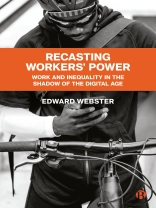Much of the debate on the future of work has focused on responses to technological trends in the Global North, with little evidence on how these trends are impacting work and workers in the Global South.
Drawing on a rich selection of ethnographic studies of precarious work in Africa, this innovative book discusses how globalisation and digitalisation are drivers for structural change and examines their implications for labour. Bringing together global labour studies and inequality studies, it explores the role of digital technology in new business models, and ways in which digitalisation can be harnessed for counter mobilisation by the new worker.
Inhoudsopgave
1. The End of Labour? Rethinking the Labour Question in the Digital Age
2. Precarious Work after Apartheid: Experimenting with Alternative Forms of Representation in the Informal Sector – with Kally Forrest
3. Neo-liberalism comes to Johannesburg: Changing the Rules of the Game
4. Divided Workers, Divided Struggles: Entrenching Dualisation and the Struggle for Equalisation in South Africa’s Manufacturing Sector – Lynford Dor
5. Authoritarian Algorithmic Management: The Double-edged Sword of the Gig Economies – with Fikile Masikane
6. Crossing the Divide: Informal Workers and Trade Unions – with Carmen Ludwig
7. Global Capital, Global Labour: The Possibilities of Transnational Activism – with Carmen Ludwig
8. Changing Sources of Power and the Future of Southern Labour
Over de auteur
Lynford Dor is a Doctoral Researcher at KU Leuven’s Centre for Sociological Research (CESO) and a Research Associate at the University of Johannesburg’s SARCHI Chair in Social Change (CSC).












